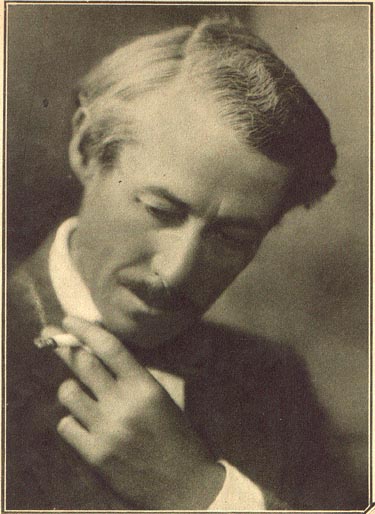Henry B. Walthall: Biography--Escaping "Poverty
Row"
A Tribute Page to the Silent Film Star
Escaping "Poverty Row"
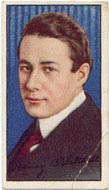
Cigarette card, circa 1916.
Note: I spent a lot of time
and care writing this biography and tried to reference every source
I used so, if any visitor finds a use for any
of the information here or on the other pages of this
site, please note this source. Thank you, M.W.
While The Birth of a
Nation assured Henry B. Walthall's place in motion picture history,
it did not assure that he would be on top of the film acting world
through the rest of his career. From 1914 to 1916, however,
Walthall was as popular, if not more so, than any other
player on the silent screen. On the
back of a period cigarette card (circa 1916) is stated that "Mr.
Walthall is probably seen in more pictures and places than any other
screen artist [and] is considered by many the best actor in the
motion picture world to-day." Fan magazines of the time
sport similar praises. One is shocked to see Walthall
ranked a lowly 19th in the 1916 article "The Twenty Greatest of Filmdom"
(Grau, pg. 181). Perhaps a readers' poll in the same
issue is more indicative of Walthall's popularity at
the time. He ranked a close #2 (19,760 votes to
Earle Williams' 19,920) for his role in The Birth of a
Nation as well as being listed four additional
times for other parts, including over 14,000 votes each
for his performances in Ghosts (#18) and The Avenging
Conscience (#7)
(pp. 179-80). At the zenith of his work under D.W. Griffith,
Walthall earned the princely sum of $175 per week (Katchmer). The
profession he once derided had made him a very wealthy and
famous man.
Walthall left Griffith following The Birth of a Nation.
Several reasons are given for his departure: uncertain
health caused the actor to stay in California rather
than follow the director back to New York (Rankin, pg 96),
he wanted to strike out on his own (Franklin, pg. 241),
or he was encouraged to leave because no obvious role
was available to him in Griffith's next big budget film,
Intolerance (Slide II, pg. 402). Whatever the reason
or reasons, Walthall's decision to leave Griffith had
an adverse effect on his career. As one author observed,
"His career, which undoubtedly would have developed along the
spectacular lines of those of Lillian Gish, Mae Marsh,
and Richard Barthelmess, came to a sudden standstill,
and he wasted a decade in interesting but minor films
quite unworthy of him" (Franklin, pg. 241).
Walthall starred in a few more classics in 1915. The
horror film Ghosts gave the actor a chance to top
the physical/psychological breakdown scenes of The Avenging
Conscience as a man who inherited his father's
debilitating disease. In the late spring of the same year,
Walthall joined the declining Chicago-based Essanay company (Slide II,
pg. 402).
His best portrayal for Essanay was that of Edgar Allan
Poe in The Raven. An ardent reader of Poe's works
since childhood, Walthall played the troubled soul more
convincingly than probably any other actor could. The following
year, Walthall starred or co-starred in several films
that received much attention including The Sting of
Victory, The Truant Soul, and the serial
The Strange Case of Mary Page.
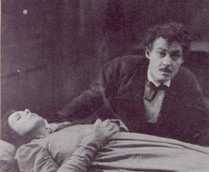
As Edgar Allan Poe in Essanay's The Raven.
The years 1917 and 1918 were pivotal for Henry B. Walthall,
both professionally and personally. After a two-year
stint in Chicago with Essanay, Walthall vowed to move
away from the bizarre, morbid roles that made him famous beyond
the "Little Colonel." "Never again!," Walthall asserted
to an interviewer in 1917, "If I can make a living
otherwise, I will never play a dope fiend again, or a booze fighter,
or a man with a portable soul. I'm off that stuff for
life, if I may be allowed to revert to a very expressive
slang phrase. I suppose it was all right in the
beginning. It was something new and different from the
sort of screen pabulum that was provided in those
early days...Perhaps it was the great war with its
attendant sorrows that brought about the changes in the
attitude of the screen patrons [Walthall's brother, Junius,
was wounded in the war] or, maybe they just
naturally sickened of grief and morbidity as a steady
diet. At any rate the ban is on that form of drama and
I hope for good" (Cohn, pg. 32).
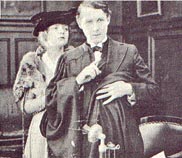
In His Robe of Honor.
Along with this change
in attitude regarding future character portrayals
came, in 1918, a change in companies.
Walthall started his own company Henry B. Walthall
Pictures Inc. under the aegis of Paralta Plays, Inc.
(Walraven). His Robe of Honor and Humdrum
Brown resulted
from this independent undertaking. Walthall had the
leading roles in both films under the direction of
Rex Ingram; however, neither film met much success.
That same year, Walthall found himself reuniting briefly
with D.W. Griffith in the forgotten film The Great Love,
co-starring Lillian Gish. Critics did not receive the
film well and faulted Walthall's acting as
"over-melodramatic" which, according to Anthony Slide,
"is possibly the reason Griffith decided not to use
him again until the coming of sound" (Wagenknecht and
Slide, pg. 101). Since the film is "lost," one cannot
see for one's self whether the critics were fair
in their assessment.
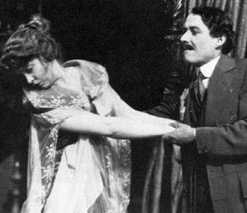
Being "over-melodramatic" in The Great Love.
Lillian
Gish is the victim.
Privately, Walthall also made a couple of life-changing
decisions between 1917 and 1918. While in Chicago,
he filed for divorce from his first wife of ten years, Isabelle
Fenton, on the ground of desertion. Fenton was an actress
of the stage who probably never ventured into film. No additional information on
this woman can be found. A clipping from an unknown
movie magazine states that the couple had been estranged
since March 1917. Accounts of his life with the Biograph
company include no mention of a wife. Certainly she would have
accompanied him at least on several occasions. One
may speculate that this estrangement first occurred
years before, perhaps when young Henry was a struggling
stage actor; however, documented hints as to the couple's
relationship are yet to be found. What is certain is
that, soon after the divorce, Walthall married Irish
actress Mary Charleson. They appeared together in several
productions before Mrs. Walthall gave up her acting career
to support that of her husband. The Walthalls' first
and only child, daughter Patricia, was born in 1918.
By all accounts, their marriage was a happy
one. Mary took active charge of Henry's business and personal affairs,
giving the actor more time to concentrate on his craft
(McGaffey, pg. 33). Henry also rehearsed his lines with Mary and she
often accompanied him on movie sets. One admirer of the couple commented,
"It does one good, in these hectic days of the 18th
Amendment [the dreaded Prohibition, of course!],
knee-length skirts [was the complaint that they were
too high, or not high enough?], suffrage, national
politics, and the usual 'cussedness' of the century, to
meet two people who are as sane, as wholesome and as
well-balanced as Mr. and Mrs. Walthall" (Gaddis, pg. 39).
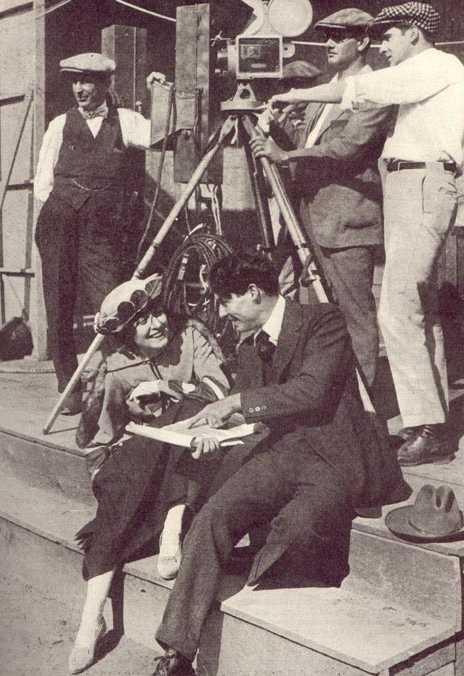
A "wholesome couple": Mary Charleson and
Henry Walthall going over
a script.
While Walthall's family life seemed to be stable, his
career was in rapid decline as the motion picture
world prepared to enter the "Roaring Twenties." Walthall
had two leading roles in suspense-filled dramas at the turn of the
decade in
The False Faces (1919) and The Confession
(1920). In the former, Walthall played Michael Lanyard, "The
Lone Wolf" from the Louis Joseph Vance pulp fiction
novels; in the latter, Walthall played one of those dreaded
men of the cloth who sets out to save his brother from the
gallows without revealing the confidentiality of the
real killer's confessional. After these, roles of
distinction were few and
far between. Important films in which he had bit parts
during the 1920s include Clara Bow's The Plastic
Age (1925) and Wings (1927), the latter
of which won the first Academy Award. Notable
films in which he had larger roles include One Clear Call
(1922), The Barrier (1926) with Lionel Barrymore,
The Unknown Soldier (1926), a reunion with
Lillian Gish in The Scarlet Letter (1926), and
the Lon Chaney films The Road to Mandalay (1926)
and the "lost" London After Midnight (1927), the
latter achieving cult status due to Chaney's over-the-top
vampire stills. Such production seems impressive; however,
it was still a far cry from 'Wally's' days with D.W. Griffith.
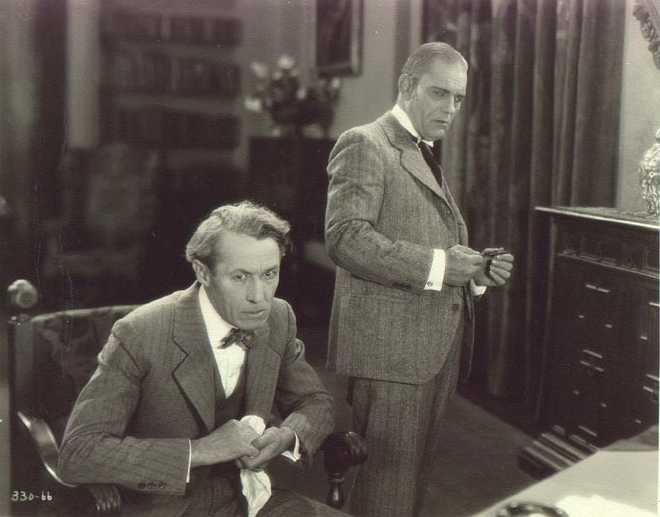
With Lon Chaney in the "lost" cult classic London After Midnight.
The movie magazines picked up on this dry period of
Walthall's career. In a 1926 issue of Motion Picture,
Walthall is pictured among others like Francis X. Bushman
in the article "Poverty Row": "It's a strange place, Poverty Row--gray
with disappointment and bitter with failure, yet shot through with
the golden gleam of hope. Work, work, work! Those going
up work eagerly. The Will o' Wisp, ahead,
beckons. Those, coming down, work doggedly, for bread--or
gaily, for bravado--or sullenly, for shame--and those
who are climbing up a second time, work silently. It
is harder the second time, because in failure, they are
burdened with the memory of success." Still, on the
"mythical ladder in Poverty Row," Walthall was an actor
who was "climbing up again" (Benthall, pp. 26, 113).
As late as 1932, Walthall is again pictured among others
of various occupations who have seen declining fame.
This time the word for it was "Fade-out;" in Walthall's
case, fading from "star to extra" (Parton, pg. 18).
Although, Walthall's star was fading, he still had the
magic to capture the imagination of 12-year-old John Griggs.
After seeing The Confession, Griggs began a
life-long devotion to the actor who "worked his sorcery
as he played a Catholic priest" (pg. 118). In 1922, Griggs
saw Walthall playing a dual vaudeville stage role as a French father
who believed his son had fled the French Army in an
act of unforgivable cowardice and then, later, as the
spirit of the Unknown Soldier--his son. Griggs admitted
that "following Walthall in the 'twenties was difficult" (pg. 119).
The young fan, who was also an aspiring actor, undertook treks
to out-of-the-way theatres to watch the master in bit
roles. Once Griggs was so distraught after seeing that
Walthall's part in DeMille's Golden Bed made up
only a few seconds that the operator cut him a few inches
of the scene (pg. 119). Later, Griggs collected 35 mm
prints and, in the 1940s, played The Confession
to an audience of teenagers at a local Catholic school.
According to Griggs, "after the show, when we collected
our six hundred questionnaires, not one teenager
had noticed the infirmities of this old silent picture.
One teenager wrote: 'I have never seen a silent picture
or heard of Henry B. Walthall but I'll never forget
his face'" (pg. 121). One shudders to think what the
reaction of today's teenagers would be.
A 1928 premiere for a starring theatre performance (his first in eight years)
showed that Walthall could still pack them in. D. W. Griffith was master of
ceremonies at the Grand Avenue Playhouse in Los Angeles for the premiere of
the play Speakeasy (also to be an early talking motion picture). The entire
theatre was decorated in Walthall's honor and the reservation list included such
names as Pola Negri, Alan Hale, Lon Chaney, Greta Garbo, Mary Philbin, Harry
Langdon, Edmond Lowe, Mack Swain, and Charles Chaplin (Los Angeles Record, March
19, 1928).
To most people outside the movie business who remembered him, however,
Walthall was still the
"Little Colonel."
Featured interviews with the actor
during this dry spell usually consisted of him going
down memory lane (15-20 years down it anyway, which
must have seemed a lot longer ago then than such a span
of time is regarded today), discussing the good ol'
days of the Biograph company or actors and actresses
he worked with, such as Mary Pickford (Donnell, Kingsley).
Curiously, in one of these issues where Walthall was
"remembering when," The Birth of a Nation was
voted "Most Popular Picture" ten years after its release.
In 1928, director Percy Knighten went so far as to name his
film starring Walthall The Little Colonel in what
a reviewer from an unknown clipping source claimed was
"a sad attempt to repeat Henry B. Walthall's success in
'The Birth of a Nation.'" This film no doubt is lost and
does not even appear in Walthall's filmography. Perhaps there
is a reason as the reviewer goes on to add that "Knighten is no
Griffith." Still, although many of Walthall's films during this
period were not received with enthusiasm and are largely forgotten
today, those who reviewed films like Light in the Window and
The Phantom in the House, usually discovered at least one positive
element: Walthall's performance. Comments such as "H. B. Walthall acts
very well. The others are good enough to pass" (review for The Phantom
in the House) or "bad script, but our old
friend Henry B. Wallthall registers neatly" (review for the Warner Brothers
Vitaphone short Retribution) were not uncommon. Walthall kept
climbing to reclaim his place among the top film actors. Not
a year went by without Walthall appearing in at least a few pictures.
A 1930 photo from an
unknown source has the following caption: "Today Henry
B. Walthall plays small roles in the talkies, forgotten
by the newer generation, But, to the older, there will never be a screen
actor so compelling, so romantic, so lovable. To him--the little
colonel of "The Birth of a Nation"--this page is dedicated." These
"small roles in the talkies" were the beginning of new found fame
for the "Little Colonel."
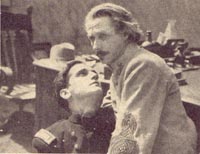
The Little Colonel: The Movie! Possibly the lowest
rung on the "mythical
ladder" in Poverty Row.
Viva Sound!
Many have read the stories of how a silent movie star's career went
south after the emergence of sound because his or her voice was not
suitable for the talkies. Usually, even in the case of John Gilbert,
such stories were myths. In Henry B. Walthall's case, however, the
opposite held true. His stage-trained voice, rich and clear, proved
perfect for authoritarian roles. Walthall often played fathers, uncles,
lawyers, professors, and, yes, those dreaded ministers. Like most
actors of the silent period, Walthall was skeptical about the new
talking pictures: "I think that silent acting is much more difficult
than the talking screen acting. You must put so much
into your face and gestures in the silent pictures. In
speaking lines, too, you drop all expression. Talking
pictures lack effectiveness for that reason" (Kingsley, pg. 103).
But the Talkies would "rediscover" Walthall and give
him the opportunity to do what few motion picture pioneers
achieved: find fame in both silents and sound.
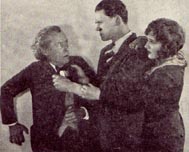
That's no way to treat a little colonel!
Getting roughed up in
the early Talkie Speakeasy.
At the beginning of the Talkies, Walthall still usually
played bit roles, sometimes alongside legends before they
were legends, like John Wayne (Ride Him, Cowboy), Spencer Tracy
(Me and My Gal), and Clark Gable (Men in White).
He also made a brief, but memorable, appearance in D.W.
Griffith's first Talkie Abraham Lincoln.
In the minor production Police Court, Walthall enjoyed
one of his few leading roles of the Talkies. He incorporated
"expression" to his speaking role, especially in the death
scene. Walthall's character was pathetic; a former
star whose life has unraveled due to drink. He resorts
to dressing up like Lincoln and other Civil War figures
reciting speeches in a sleazy carnival--hardly the hero
he was in The Birth of a Nation. In Hollywood
terms, his time as a screen idol had past. Although
still extremely handsome and better looking than most
of the leading actors of the day, he had aged considerably
through the years. But heroes come in different packages,
and Walthall still had the ability to steal the show.
The first role in the talking pictures that gave Walthall
the recognition he deserved was as Francisco Madero
in Viva Villa! (1934). "The Little Colonel
Marches Back" declared an article celebrating Walthall
as the compassionate revolutionary leader.
"You cannot call it a comeback," the actor pointed out,
"because I have never really been away" (Rankin, pg. 70).
The role gave Walthall "a new lease on life," but his
greatest talking role was soon to come (Williams).
The film that catapulted Walthall completely
out of "Poverty Row" and placed him firmly on a
respectable platform in the acting field was Judge Priest.
Alongside Will Rogers, Walthall was the Reverend Ashby Brand
(yet another minister). His was a character role, but it
became far more than that. Judge Priest was the one
film of the sound era--not of the B-picture variety--that
gave Walthall the chance to steal the show at the
end. He seized this opportunity with relish. When the
closing credits ran, the viewer was left with a dominant
impression. The film was no longer about Will
Rogers' character, the character on trial, or Stepin
Fetchit's character; it was about Ashby Brand's moving
10-minute speech that tipped the scales in the case of
a former Confederate soldier. "I felt that the role had such
dramatic possibilities
that I expended every ounce of energy in making it
alive," Walthall explained, "I consider the part one of the
best I have ever played, regardless of length, and that
is the reason I became so enthusiastic in this interpretation"
(Williams). Walthall signed a contract with Fox within
24 hours of his courtroom scene. Praise from fans and Hollywood
people soon followed. "During the past few months my
fan mail has increased to very satisfactorily proportions,"
Walthall beamed, "My wife and daughter are as delighted as
I am" (Williams). The "Little Colonel" was the hero
again.

The hero again: Ashby Brand.
Several interesting films followed Judge Priest,
including A Tale of Two Cities with Ronald
Colman and Dante's Inferno with Spencer Tracy.
China Clipper in 1936 offered Walthall
another exciting opportunity. Walthall played airplane engineer Dad Brunn
who is pushed
to the limit by a man obsessed with starting a trans-Pacific mail route.
Brunn was a pivotal role and
Walthall received much air time during the first
half of the film. His character, however, suffered
a sudden demise. Walthall, himself, collapsed.
Ill from the beginning of the production, Walthall
soldiered through the scenes until it was obvious
that he could not finish the role. According to
the obituary in the San Francisco Chronicle, Walthall was working
at the Alameda
base of the Pan-American Airways under the constant care of a nurse.
When his condition worsened, Henry was brought back
to his
home to the San Fernando valley via boat. After a few days, physicians
had him transported to the Pottenger Sanitarium at Monrovia.
He failed to respond to
treatment and died at around 5:35 a.m. on Wednesday, June
17, 1936. Two accounts state that his wife and daughter did not arrive
in time to say their good-byes. The Los Angeles Times, however,
noted that his family visited him the day before. Approximately three weeks
passed
between leaving for home and his death. Ironically,
his illness forced Walthall to stop work before his
own character was to die in the film. The script was
altered, and Dad Brunn died off camera. This time his
illness was given a name, albeit ambiguous: intestinal influenza
exacerbated by
a nervous condition and an exhausting string of
uninterrupted film work.
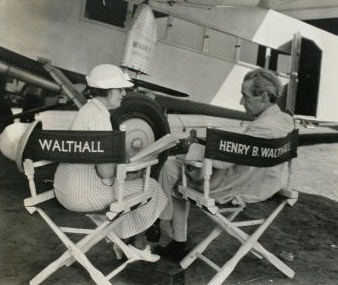
Henry rehearsing his lines with wife Mary on the set of
China Clipper
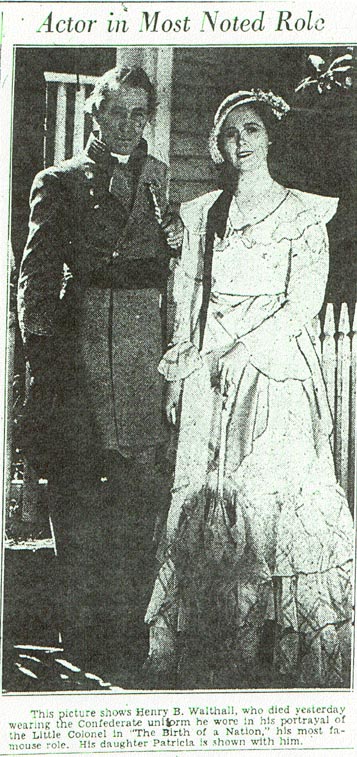
The uniform still fits: Henry back in Confederate
grey
for Judge Priest with daughter Patricia. From the
Los Angeles Times obituary,
June 18, 1936, pg. 10.
Henry B. Walthall was many things: an actor, of course,
but a hunter, an avid reader, a dedicated Mason, a
southern gentleman and, above all, a good person.
His philosophy, according to brother Wales, was to
"be worthy of the regard of mankind" (Griggs, pg. 124).
He certainly was.
Upon hearing of 'Wally's' death, a shocked D.W.
Griffith made the following comments: "I don't know
whether you could call him a great actor, but this I am
certain--he had a great soul. It is given perhaps
to many to have great souls; it is given to only a few
to be able to express that soul to the entire world
by means of an expressive face and body, as Henry Walthall
did in The Birth of a Nation. Of course, the
world doesn't know and doesn't bother much about
that sort of thing, but he had a poet's imagination and
a beautiful face that could express the soul and
imagination he possessed. He was a gentleman, and, as
Hollywood puts it, 'a sweet guy.'" (Slide II, pg. 403).
We
are lucky to be able to see Walthall's "soul and
imagination" in some of his best roles like
The Birth of a Nation and Judge Priest,
which are still available for present and future generations
to enjoy.
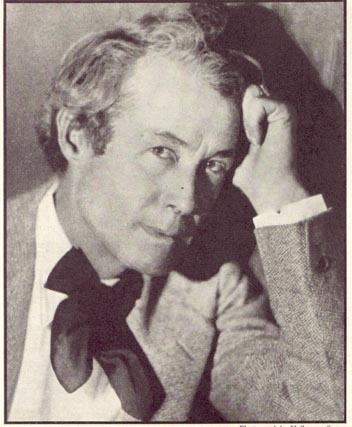
My favorite photo of Henry Walthall (sigh)
Please see the Bibliography
pages for details on the references used in this biography.

Free Counter
